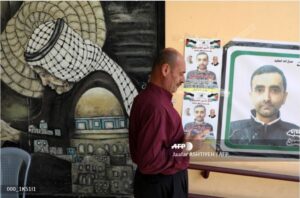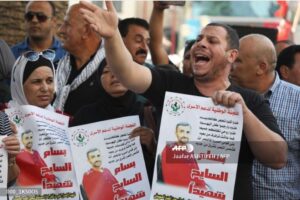CAMERA’s Israel office has prompted Agence France Presse to correct over a dozen captions which last week whitewashed Hamas terrorist Bassam al-Sayeh, erasing his conviction for his role in the October 2015 shooting murder of Rabbi Eitam and Naama Henkin in front of their four children. In response to CAMERA’s communication, editors commendably added the essential information about the Henkins and fixed additional problematic elements of the captions.
As CAMERA first reported last week, when convict al-Sayeh died in an Israeli hospital, as a result of complications from cancer, AFP photo captions ignored both his crime and his disease. While the captions erred that he reportedly died in Israeli prison, and included many other biographical details such as his age, that he was from Nablus, that he was allegedly the 221st Palestinian prisoner to die in Israeli jail, and that he was arrested by Israeli forces in October 2015, they omitted the two key points to understanding why he died in prison. 1) He died from his disease. 2) He was in prison for his role in a double murder. The failure to note his fatal medication condition falsely implied that he died due to prison conditions.

A Palestinian protester kicks a burning tyre during a demonstration near the Jewish settlement of Beit El in the occupied West Bank on September 9, 2019, following the reported death of Bassam al-Sayeh in an Israeli prison. Sayeh, 47, from the northern West Bank city of Nablus was arrested by Israeli forces in October 2015. “Al-Sayeh is the 221st Palestinian prisoner to lose his life in Israeli prisons since 1967” said a spokesman of the prisoner rights organization. Abbas MOMANI / AFP

A man walks in front of posters showing pictures of Bassam al-Sayeh, a Palestinian who reportedly died in an Israeli jail, during a mourning ceremony at his home in the West Bank city of Nablus on September 9, 2019. Sayeh, 47, was arrested by Israeli forces in October 2015. Jaafar ASHTIYEH / AFP

Palestinian protesters shout slogans during a demonstration in the Israeli-occupied West Bank city of Nablus on September 9, 2019, following the reported death of Bassam al-Sayeh (portrait) in an Israeli prison. Sayeh, 47, from the northern West Bank city of Nablus was arrested by Israeli forces in October 2015. “Al-Sayeh is the 221st Palestinian prisoner to lose his life in Israeli prisons since 1967” said a spokesman of the prisoner rights organization. Jaafar ASHTIYEH / AFP
Notably, the posters featured in the above photo are emblazoned with an antisemitic, inciting poem that originated in North Africa and is popular among Islamists including the Muslim Brotherhood and Hamas. The poem calls for violence against all Jews, stating: “Take a heart that became as hard as iron; Take it and stone [with it] all Jews.”
When one takes into account that al-Sayeh was behind the brutal murder of two Jewish parents in front of their young children, that his supporters would display slogan should hardly be surprising. But by concealing both the slogan’s meaning and al-Sayeh’s crimes, AFP falsely casted al-Sayeh as a victim, not the accomplice to murder that he was.
Sayeh, 47, had been convicted in Israel of authorizing and helping fund an October 2015 shooting attack on a West Bank road in which Eitam and Naama Henkin were gunned down in front of their four children, a Shin Bet spokesman said. . . .The Israel Prisons Service confirmed in a statement that Sayeh had died. It said the Hamas operative had suffered from incurable chronic illnesses since he first came into its custody in October 2015.
The Izz ad-Din al-Qassam Brigades, Hamas’s military wing, said in a statement that Sayeh served as a field commander in its ranks and was one of the perpetrators of the attack against the Henkins.
To their credit, AFP editors issued forthright and comprehensive corrections to the captions. All of the AFP captions about Bassam Al-Sayeh now include the following:
Bassam al-Sayeh, who suffered from bone and blood cancer, died at the Assaf Harofeh Medical Center in Beer Yaakov, according to the Palestinian Authority Prisoner Affairs Commission. Sayeh, 47,had been convicted in Israel of authorizing and helping fund an October 2015 shooting attack on a West Bank road in which Rabbi Eitam and Naama Henkin were gunned down in front of their four children, a Shin Bet spokesman said.
The substantive changes include the following improvements:
- The addition of the fact that al-Sayeh suffered from bone and blood cancer.
- The addition of the fact that he died in Assaf Harofeh Medical Center in Beer Yaakov. (Both points one and two are attributed to the Palestinian Authority Prisoner Affairs Commission.)
- The addition of the essential fact that al-Sayeh was convicted in Israel for authorizing and helping fund the fatal West Bank shooting attack on the Henkins, gunned down in front of their four children (attributed to the Shin Bet).
- Removal of the irrelevant, false claim that he was the 221st Palestinian prisoner to die in Israeli jail.
- Removal of mention that his arrest took place in October 2015 (a fact which had previously been included without any indication of the crime which prompted the arrest.)
